Playing for your piano teacher at lessons. Playing in a formal recital. Playing at a nursing home. Playing for friends gathered around the piano to hear you play once they found out you were learning piano. Taking piano exams. Playing at a competition. Auditioning for college. Recording yourself for an online submission recital or competition.
All of these scenarios share one thing in common: they involve other people hearing you play.
While sharing what you love often brings joy to both the one sharing and the one receiving, performance scenarios can strangely induce sudden fear in the performer. Most people think that when they experience this, they may not be cut out to perform despite really wanting to perform. As the days of the performance loom closer, the anxiety sets in and can turn all your hard-earned effort into a jumbled mess on stage.
I remember as a child competing in a local piano guild competition. I was up against some really talented kids, and I knew I wasn’t very good. I really felt like a fish out of water as I waited for my turn to play, hearing the beautiful, flawless playing of my competitors on the other side of the door and seeing kids walk around puffed up with confidence. At least that was my perception. I have no recollection of how I played, but to my surprise I won 2nd place. Now for me, I was used to getting the medals in school for “participating” – essentially having a pulse – or no award at all. So to win 2nd place, that little red ribbon meant a lot to me. I think I still have it tucked away somewhere.
But what really happened when I played? I felt terrible going in, had no idea what happened when I was playing, and afterwards I felt like I had failed – even to the point of disbelieving that I actually earned that 2nd place, and that it had been given to me out of pity! What was going on here was actually known as “performance anxiety.”
While not everyone experiences this feeling, it is quite a common phenomenon. Even among professional musicians, around 90% experience some level of performance anxiety. So if you, too, have felt this in a performance, then you are in good company! But that’s not the only thing I have to tell you. There are specific ways that can help you overcome this fear and there are added side effects: you might even enjoy doing it, and your playing may become more musical!
 Before we get into the details, however, let’s discuss the different ways this fear can manifest itself. I’ve talked to many students and fellow musicians about this and compared it with my own experience. For me, the fear would begin pretty much as soon as I would commit to a performance of some kind, and would continue all the way through the entire performance. There were some exceptions, but for the most part, that’s how it was for me. Others I’ve spoken to would say they get nervous beforehand but once they get going it’s fine. Yet others said that they’d be fine and then once they started playing it would hit them and everything would fall apart.
Before we get into the details, however, let’s discuss the different ways this fear can manifest itself. I’ve talked to many students and fellow musicians about this and compared it with my own experience. For me, the fear would begin pretty much as soon as I would commit to a performance of some kind, and would continue all the way through the entire performance. There were some exceptions, but for the most part, that’s how it was for me. Others I’ve spoken to would say they get nervous beforehand but once they get going it’s fine. Yet others said that they’d be fine and then once they started playing it would hit them and everything would fall apart.
So no matter which camp you are in, they all fall into the category of performance anxiety. Not everyone experiences the same degree of fear, either. Some have only a mild apprehension that doesn’t really effect their playing. Some can be at the other extreme to the point where they have panic attacks and can’t even walk up to the piano, or if they force themselves, it turns their hard-earned effort into a complete disaster.
Love Mode vs. Fear Mode
Love Mode is what drives us to learn piano or whatever instrument. It is what compels us to practice for hours, sacrifice money for lessons and an instrument, and what drives us to get better. We love the music we want to create. It even is the thing that compels us to agree to perform! When you love something, you want everyone to know about it, and your joy expands the more people you share with.
Fear Mode, however, takes us by surprise. We love music and love the idea of sharing it with others in any number of ways, and then suddenly, we’re afraid. We fear making mistakes and not truly representing the thing we love. We fear disappointing those who have supported us in our journey. We fear the audiences or judges or teachers thinking that we’ve wasted their time and we’ve made something that should be entertaining to them a painful experience.
We may not even know specifically what strikes fear in us – it could simply be some unreasonable voice in our head that tells us we’re just faking our way through this whole music learning thing, and someday during a performance, we will be found out. Fear Mode may not even be a conscious thing, but we certainly feel it when our fingers shake uncontrollably, our knees wobble, our minds go blank, our eyes stop seeing, our hands sweat, our bellies do flip-flops…the list goes on.
In essence, performance anxiety occurs when a person falls out of Love Mode and falls into Fear Mode.
The degree to which you feel this fear depends largely upon:
- Preparation
- Outlook
- What’s really at stake/what’s the goal
- Inner Dialogue & Musicality
- Self-Assessment
As you can see, performance anxiety is a multi-faceted issue that must be attacked on all fronts in order to re-program oneself. We’ll explore each of these points in depth to help you understand what is causing performance anxiety in you and how you can combat it.
Keep in mind that this is a process, and a complex one. There will not be a “trick” that will get you there, nor will it be a “one and done” effort. Performance anxiety will probably be something you will have to deal with for the rest of your performing life. But hopefully as you proceed through this process you will begin to compile a list of things that you know are necessary for yourself in order to have a good performance experience. The more positive performing experiences, the less anxiety you will have. In other words, the more you are in Love Mode, the less anxiety you will experience.

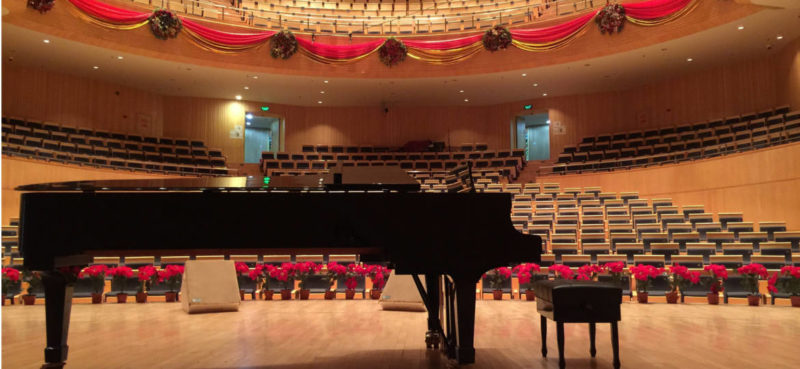
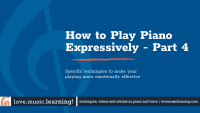
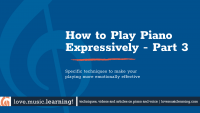
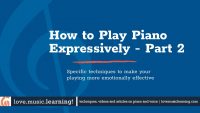
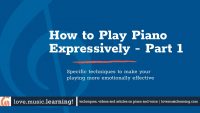
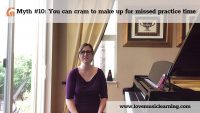

Performance anxiety is a huge struggle of mine for many years. I started with piano. One bad recital scared me for life. I still hate playing piano in public to this day. Now for dance or singing performances, I’m nervous up to the point of taking my place on stage and the I’m cool as a cucumber. It’s so strange but it happens every single time!
It is such a complex issue! I had severe anxiety for piano but not for singing. I think each person has to figure out what is going on and learn to cope with that aspect. It’s definitely a process.
I also find piano performances the most difficult . When I was younger I danced and as an adult took tests in dance skating without a problem. When I play the piano I front of others I become extremely nervous. I am okay if it is an informal setting with just friends or family. However a more formal recital is nerve wracking. I returned to the piano and taking lessons about six years ago after many years away from the piano . It is frustrating to work so hard and then get in front of people and cannot play how I want.
Judy
Judy, I know just what you mean! The good news is that you’re not alone in this, and there’s a way to make things so much more enjoyable when performing! I try to address all angles of this, because for many of us it is multi-faceted. I hope this series helps you narrow in on the parts that are holding you back, and at the very least give you avenues to explore!